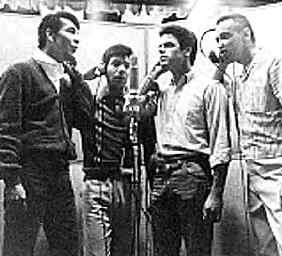
LEFT TO RIGHT: .PHIL STEWART, RICHIE ROTKIN, ARNIE MARCUS, ERNIE BRINGAS
The Rip Chords, originally known as the Opposiites. were an early 60s vocal group that was associated with hot-rod and surf music.
Rip Chords

LEFT TO RIGHT: .PHIL STEWART, RICHIE ROTKIN, ARNIE
MARCUS, ERNIE BRINGAS
The Rip Chords, originally known as the Opposiites. were an early 60s vocal group that was
associated with hot-rod and surf music.
![]()
Members:
Phil Stewart
Arnie Marcus
Rich Rotkin
Bernie Bringas
Terry Melcher
Bruce Johnston
|
|
|
Although a separate group was briefly put together for touring purposes, the Rip Chords were really a studio project for Bruce Johnston and Terry Melcher, both of whom would go on to bigger and better things (Johnston as a member of the Beach Boys, Melcher as producer of the Byrds' early albums). In early 1964, they made the top 5 with "Hey Little Cobra," one of the best (and indeed one of the few) hot rod hits not sung by the Beach Boys or Jan & Dean. It proved to be a one-shot, though they made the Top 30 again with the "Hey Little Cobra" soundalike "Three Window Coupe." Most of their limited output under the Rip Chords name was formulaic, upbeat hot rod and surf tunes, with occasional nods to Dion and doo-wop. Although their records weren't terribly memorable beyond their big hit, the Rip Chords attract interest from surf collectors, as they recorded obscure tunes by such major figures of the L.A. surf-pop-rock scene as P.F. Sloan, Steve Barri, and Jan Berry, as well as writing many of their own songs. -- Richie Unterberger, All-Music Guide
|
|
Phil Stewart and Bringas became acquainted during the mid-1950s as students at Inglewood High School They discovered some complementary musical talents and struck up a friendship. Encouraged by their singing compatibility, they were determined to secure a recording contract. They eventually came to the attention of Arwin Records/Daywin Music in 1962.
Actress-singer Doris Day and her husband, film producer Marty Melcher, owned Arwin Records and Daywin Music. Their son, Terry Melcher, had just been hired by Columbia Records as an Artist and Repertoire producer. Arwin Records vice-president Bob Crystal saw potential in Stewart and Bringas' voices, and quickly arranged for an audition at Columbia Records.
Following the audition, Terry Melcher signed Stewart and Bringas to a recording contract at Columbia. Their name, the Opposites, seemed apropos at the time because Bringas was studying for the ministry and Stewart was a private detective. But shortly before their first release, the name was changed to the Rip Chords. The change was prompted by concerns that the Opposites could falsely imply a positive versus negative image of the two friends.
The Rip Chords were a vocal group not a band and were backed by studio musicians. These musicians, including guitarist Glen Campbell, drummer Hal Blaine, and bassist Ray Pohlman, and other prominent instrumentalists, were known as the Wrecking Crew.
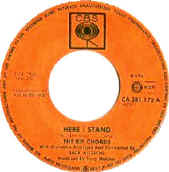
Terry Melcher produced the Rip Chords' first release, "Here I Stand", a remake of the Wade Flemons version. Recorded on December 17, 1962, it peaked at No. 51 on the Billboard Hot 100 in early 1963. Stewart and Bringas were the only singers on the first release. Bringas sang the lead, the falsetto, and also joined Stewart on the background vocals.
|
|
The group's second single, again produced by Melcher, was "Gone", recorded April 26, 1963. Bringas sang the lead and the falsetto, with Stewart and Bringas doing layered background vocals and The Blossoms providing additional background vocals during the intro and outro. Bruce Johnston added an interjecting falsetto, and Blossoms member Gracia Nitzche performed the spoken word intro. Although the song made the Billboard Hot 100, it did not do as well as well as the previous hit, "Here I Stand".
Following the release of "Gone", a problem arose for the Rip Chords. Bringas had just graduated from California State University at Long Beach and was planning to do graduate work at United Theological Seminary in Dayton, Ohio, where he eventually earned his Master of Divinity degree. His educational responsibilities would not allow time for the touring aspect of a recording group.
Due to his ministerial studies, Bringas was unable to get back to Hollywood for the next recording session. This left Stewart momentarily without a singing partner. Melcher and co-producer Johnston stepped in vocally to fill the void created by Bringas' brief absence; Johnston had already sung with Stewart and Bringas on their second single "Gone". Johnston and Melcher would prove to be a significant addition as the Rip Chords prepared to record and release their third single.
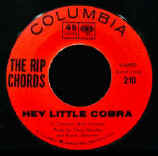
The Rip Chords' third single was the hit "Hey Little Cobra", vocally layered by Johnston and Melcher, recorded on October 15, 1963. Melcher sang the lead vocal. He and Johnston did the background vocals. The song peaked at No. 4 on the Billboard Hot 100 in February 1964.
The Rip Chords last significant single was "One Piece Bathing Suit".
The Rip Chords broke up in 1965.
In the 90s a new group was started by Rich Rotkin and Arnie Marcus but without any of the original members.
Hondells
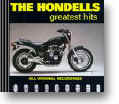
The Hondells were an surf rock band Their cover of the Beach Boys "Little
Honda" went to to No. 9 on the Billboard Hot 100 in 1964.
![]()
| Vocal Members: Chuck Girard Gay Usher Joe Kelly Ritchie Burns |
Session Muscians: Glenn Campbell Richie Polodor Al Delory Tommy Tedesco Wayne Edwards |
Members:
Chuck Girard
Gary Usher
Joe Kelly
Ritchie Burns
|
|
The Hondells were a manufactured band put together by Gary Usher, originally consisting of session musicians. Their hit song, "Little Honda," was written by Brian Wilson and Mike Love of The Beach Boys. The song was inspired by the popularity of Honda motor bikes in Southern California during the early 1960s:
The Hondells were the recipient of the best song that Brian Wilson donated to another artist, "Little Honda." One of the best hot-rod tunes, it made the Top Ten in 1964 (the Beach Boys would record their own version that year, but would not issue it as an A-side). Like numerous Southern California groups in the mid-'60s, the Hondells, despite numerous picture sleeves, were not a bonafide group. Their recordings were put together by floating lineups of Los Angeles session men, overseen by producer Gary Usher. "Little Honda" itself featured ace guitarists Glen Campbell and Richie Podolor, as well as drummer Hal Blaine. Hondells groups were put together for live performance in the wake of "Little Honda," but session musicians such as Podolor were always present on the recordings.
The Hondells never had another hit on the level of "Little Honda," but recorded a surprising quantity of material, putting out two albums and thirteen singles before the string ended in 1970. Most of their early songs were written by the songwriting team of Gary Usher and Roger Christian, both of whom had helped write early Beach Boys tunes with Brian Wilson. Wilson himself would have a songwriting credit on just one more Hondas recording ("My Buddy Seat," which he co-wrote with Usher) after "Little Honda."
For all their manufactured personnel, the Hondells weren't bad. Indeed, they probably made the best hot rod music aside from the Beach Boys and Jan & Dean, and were cuts above the generic stuff Usher ground out on several hot rod exploitation discs, although nothing else was as cool as "Little Honda." Usher eventually turned over the production reins to Mike Curb, and the Hondells made the middle of the Top 100 with a cover of the Lovin' Spoonful's "Younger Girl," although a competing version by the Critters outsold it by a large margin
|
|
The Hondells were a manufactured band put together by Gary Usher, originally consisting of session musicians. Their hit song, "Little Honda," was written by Brian Wilson and Mike Love of The Beach Boys. The song was inspired by the popularity of Honda motor bikes in Southern California during the early 1960s:
Usher then recruited a group of studio musicians – including Glen Campbell, Al DeLory, Tommy Tedesco, and Richie Podolor – to record an album of Honda-related songs for Mercury Records, with production credited to Nick Venet, though Usher was the brains behind the record. Aside from "Little Honda," most of the songs on The Hondells' Go Little Honda album were written by Usher and KFWB disc jockey and lyricist Roger Christian. The album's cover showed a four-member group and its liner notes contained an elaborate back story, penned by Christian, which posited one Ritchie Burns as the founder and leader of the band.[1] At the time the album was delivered, the name of the group had not been decided. Under consideration were two names: "The Rising Sons" and "The Hondells." Venet chose the latter and released "Little Honda" as a single under the new group name. As the song climbed the charts, Usher assembled a band to tour in support, and "Little Honda" eventually peaked at No. 9 on the U.S. pop singles chart.[1]
Contrary to popular belief, session musician drummer Hal Blaine (creator of the name "The Wrecking Crew") was not the drummer on The Hondells' version of "Little Honda". The drummer on The Hondells' "Little Honda" was Wayne Edwards who together with Richard Burns (who played bass on the session and was cited on the album's liner notes as the band's "founder") went out on the road as part of the touring Hondells.[1] Blaine played drums on The Super Stocks' "Little Honda" (produced by Gary Usher for Capitol) and on Pat Boone's version of the tune (produced by Terry Melcher as a single for Dot Records).
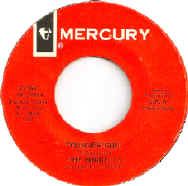
The Hondells scored another modest hit single in 1966 with a cover of the Lovin' Spoonful song "Younger Girl" (Mercury 72562) before disbanding.[1] Randy Thomas sang the lead.
Gary Usher & Co.
Gary Usher continued to mine this genre of music with numerous 'bands' made up of session musicians doing one-off recordings.[1] They were from the conglomerate of session musicians known as The Wrecking Crew, which had a rotating lineup of the same basic people. For instance, if Hal Blaine was not the drummer, then it was Earl Palmer. These fictional bands issued recordings as The Sunsets, The Four Speeds, Gary Usher and The Usherettes (aka: The Honeys), The Competitors, The Go-Go's, The Devons, The Ghouls, The Super Stocks, The Indigos, The Revells, The Kickstands and The Knights. Most of these have been re-issued on CD and are meticulously cataloged on Beach Boys fan sites.[3]
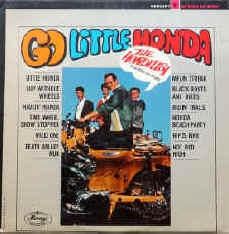
The first LP, Go Little Honda featured 11 tracks in addition to "Little Honda," all with a motorcycle theme. Richie Podolor contributed two tracks, "Haulin' Honda" and "Black Boots and Bikes." Mike Curb - who also wrote the song for Honda's "You meet the nicest people on a Honda" campaign - wrote the track "Rip's Bike."[5] The remaining tracks, written by Gary Usher and Roger Christian, consist of "Mean Streak," "A Guy Without Wheels," "The Wild One," "Hot Rod High," "Death Valley Run," "Two Wheel Show Stopper," "Ridin' Trails" and "Hon-Da Beach Party."[6]
The Hondells
The group's second LP, titled simply The Hondells, was released only a few months after Go Little Honda.[1] The LP yielded a Billboard 100 single, "My Buddy Seat," written by Brian Wilson and Gary Usher, backed with "You're Gonna Ride With Me," written by Usher and Roger Christian. Mike Curb wrote four songs that appear on the LP, "The Rebel (Without A Cause)," "The Lonely Rider," "Cycle Chase," and "The Sidewinder." The remaining tracks consisted of "Black Denim," "Night Rider," "My Little Bike," "Lay It Down," "He Wasn't Coming Back," and "Honda Holliday."